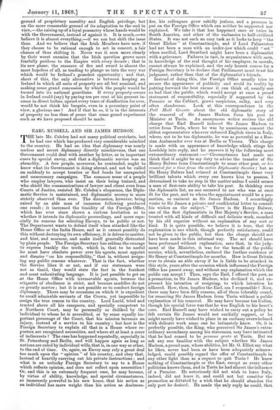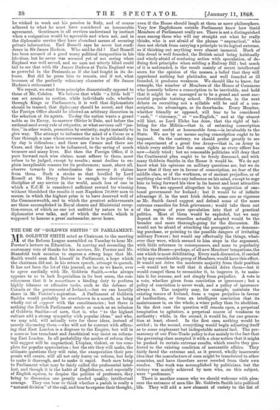EARL RUSSELL AND SIR JAMES HUDSON.
THE late Mr. Cobden had not many political crotchets, but he had one which has produced very considerable mischief to the country. He had an idea that diplomacy was nearly -useless and secret diplomacy directly mischievous, that one 'Government could deal with another by letter, or in important .eases by special envoy, and that a diplomatic service was an -absurdity. A free people, moreover, he contended, ought to know what its Government is doing abroad, and not be called -on suddenly to accept treaties or find funds for unexpected and unnecessary campaigns. The common sense of a people who employ lawyers, who insist on their being trained, and who shield the communications of lawyer and client even from Courts of Justice, resisted Mr. Cobden 's eloquence, the Diplo- matic Service is maintained, and diplomatic secrecy is more strictly observed than ever. The discussion, however, being .raised by an able man of immense following produced one result ; it increased the timidity of the Foreign Office, which has ever since shown a curious hesitation as to whether it intends its diplomatic proceedings, and more espe- cially its reasons for selecting Envoys, to be public or not. The Department wants to defend itself when attacked like the Home Office or the India House, and as it cannot possibly do this without destroying its own efficiency, it is driven to mutter, and hint, and murmur, and make itself generally distrusted by plain people. The Foreign Secretary has seldom the courage -to express frankly the truth, which is, that to be useful he must have absolute power over his agents, must appoint and dismiss "on his responsibility," that is, without assign- ing any public reasons whatever. That is the fact, whether the Service likes it or not, and if our statesmen were not so timid, they would state the fact in the frankest .and most unhesitating language. It is just possible to get on at the Home Office with irremovable agents, because the etiquette of obedience is strict, and because muddles do not so greatly matter; but it is not possible so to conduct foreign .diplomacy. There may be occasions on which it is expedient to recall admirable servants of the Crown, yet impossible to :assign the true reason to the country. Lord Lucid, tried and trusted above all his compeers, and specially competent to a Northern Court, may be personally so disliked by the individual' to whom he is accredited, or by some equally im- portant personage of the Court, that his mission becomes an injury, ifistead of a service to his country but how is the
Foreign Secretary to explain all that in a House where re-
porters are a necessities, and where sit at least a score of indiscreets ? The case has happened repeatedly, especially in St. Petersburg and Berlin, and will happen again as long as nations are ruled by individual wills, that is, in one way or other, to the end of time. Or, again, an Envoy may rely a great deal -too much upon the " opinion " of his country, and obey that, instead of heartily carrying out his private instructions ; and what is an unlucky Foreign Secretary to say to a House which reflects opinion, and does not reflect upon necessities ? Or, and this is an extremely frequent case, he may become, by virtue of ability, knowledge, and special circumstances, so immensely powerful in his new home, that his action as an individual has more weight than his action as Ambassa- dor, his colleagues grow rabidly jealous, and a pressure is put on the Foreign Office which can neither be supported nor explained. We take it that has happened once or twice in South America, and other of the embassies to half-civilized States. It was not such an easy task as it looks to keep "the Great Elchee " at Constantinople, and if Lord Palmerston had not been a man with an under-jaw which could " set " when needful, Lord Stratford might have been a diplomatist with a grievance. Failures in tact, in acquaintance with men, in knowledge of the real thought of his employer, in morals, cannot always be explained, and the only honest course for a Foreign Secretary is to declare that Parliament must trust his judgment, rather than that of the diplomatist's friends.
Instead of doing this, the Foreign Office usually tries to secure the appearance of publicity and avoid its reality by putting forward the best excuse it can think of, usually one so bad that the public, which would accept at once a proud statement of responsibility, especially if supported by the Premier or the Cabinet, grows suspicious, sulky, and very
often slanderous. Look at this correspondence in the Pall Mall Gazette about the old diplomatic story of the removal of Sir James Hudson from his post as Minister at Turin. An anonymous writer revives the old charge that Earl Russell induced Sir James Hudson to retire from Turin, where he was by unanimous consent the ablest representative who ever enforced English views in Italy, where, not to be too diplomatic, he was as powerful as a Rus- sian Ambassador ever was at Berlin or Vienna. This charge is made with an appearance of knowledge which stings his Lordship into reply, and he answers it by the following most extraordinary statement :—" Circumstances had made me think that it might be my duty to advise the transfer of Sir Henry Bulwer from Constantinople to some other post, or his removal for a time from the active Diplomatic Service ; but as Sir Henry Bulwer had evinced at Constantinople those very brilliant talents which every one knows him to possess, I determined to take no step in the matter unless I could secure a man of first-rate ability to take his post. In thinking over the diplomatic list, no one occurred to me who was at once fit for the post, and to whom the appointment would be a pro- motion, so eminent as Sir James Hudson. I accordingly wrote to Sir James a private and confidential letter to consult his wishes on the subject." There is Sir Henry Bulwer, one of the first diplomatists in Her Majesty's Service, a man trusted with all kinds of difficult and delicate work, smashed by his old superior without an explanation of any sort or kind. It is quite possible, we believe it is true, that the explanation is one which, though perfectly satisfactory, could not be given to the public, but then the charge should not have been made in this informal way. The act should have been performed without explanation, save that, in the judg- ment of the Minister, it was for the benefit of the public service, which, nevertheless, endured the further residence of Sir Henry at Constantinople for months. How is Great Britain ever to obtain an able envoy if he is liable to be attacked in this style, years after the occasion which influenced the Foreign Office has passed away, and without any explanation which the public can accept ? Then, says the Earl, I offered the post, as a promotion, to Sir James Hudson, who declined it, and ex- pressed his intention of resigning, to which intention he adhered. How, then, implies the Earl, am I responsible ? Now, there may have been fifty reasons, all of them tolerably sound, for removing Sir James Hudson from Turin without a public explanation of his removal. He may have become too Italian, though his special force was that he was English to his heart's core. Earl Russell may have wished to carry out a policy he felt certain Sir James would not cordially support, or he might merely have wished to place in an embassy overwhelmed with delicate work some one he intimately knew. Or, it is perfectly possible, the King, who perceived Sir James's extra- ordinary ascendancy among his statesmen, may have intimated that he had ceased to be persona grata at Turin. But we ask any one familiar with the subject whether Sir James Hudson, a proud man, whose abilities, let Mr. G. Elliot say what he likes, never had been or have been adequately acknow- ledged, could possibly regard the offer of Constantinople in any other light than as a request to quit Turin ? He knew nothing of Constantinople or the East, except as every other politician knows them, and in Turin he had almost the influence of a Premier. He notoriously did not wish to leave Italy, indeed, did not leave it, and could not but consider the promotion as dietated by a wish that he should abandon the only post he desired. He made the only reply he could, that
he wished to work out his pension in Italy, and of course adhered to what he must have considered an honourable agreement. Gentlemen in all services understand by instinct when a resignation would be agreeable and when not, and in the diplomatic service they have abundant means of securing private information. Earl Russell says he never lost confi- dence in Sir James Hudson. Who said he did ? Earl Russell has been accused of a good many political incapacities in his life-time, but he never was accused yet of not seeing when England was well served, and no man not utterly blind could fail to see that with Sir James Hudson at Turin England was as powerful in the Peninsula as if she had fought in its de- fence. But did he press him to remain, and if not, what becomes of the perfectly voluntary character of Sir James Hudson's retirement ?
We repeat, we start from principles diametrically opposed to those of Mr. Cobden. We believe that while "a little bell" can set armies in motion, while individuals rule, whether through Kings or Parliaments, it is well that diplomatists should be trained, that diplomacy should be secret, and that the Foreign Office should be allowed an arbitrary discretion in the selection of its agents. To-day the nation wants a grand noble as its Envoy, to-morrow Olivier 1e Dam, and before the national need every rule of etiquette, or what services call "jus- tice," in other words, promotion by seniority, ought instantly to give way. The attempt to influence the mind of a Cmsar or a Czar through a man whose conversation is to be published day by day is ridiculous ; and there are Cresars and there are Czars, and they have to be influenced, to the saving of much treasure and many lives. But then the Foreign Office, if it puts forward such wise claims, must adhere to them, must refuse to be judged, except by results ; must decline to ex- plain inexplicable reasons for its preferences; must, above all, observe towards its subordinates the secrecy it claims from them. Such a stroke as that levelled by Lord Russell at Sir Henry Bulwer is enough to destroy the discipline of any service in the world, much less of one in which a K.C.B. is considered sufficient reward for winning without bloodshed the results it cost Napoleon 70,000 men to secure, in which the highest prize is to have deserved well of the Commonwealth, and in which the greatest achievements are those accomplished in Royal closets and Ministerial recep- tion-rooms, of which no one not unfitted by nature to be a diplomatist ever talks, and of which the world, which is supposed to honour a great" ambassador, never hears.































 Previous page
Previous page